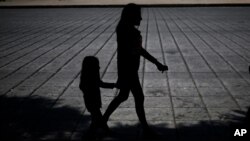Mexico will stop giving financial aid to anti-human trafficking organizations and instead run shelters and victim care directly, the president said Monday, drawing criticism from activists who said the plan lacked detail.
President Andres Manuel Lopez Obrador blamed past corruption for the move and said it would mean more money getting to the people who needed it.
"With this system of intermediation, most of the money stayed in the hands of intermediaries," Lopez Obrador said at a news conference.
"Now the government will do it directly," he added, saying he wanted to open new government shelters as soon as possible.
Mexico said earlier this month it was taking decisive action to dismantle human trafficking organizations as part of a deal with the U.S. administration of President Donald Trump to curb migration.
But academics and civil society actors said they had seen no evidence of a plan to fight the crime, and questioned Mexico's capacity to run shelters and provide services needed.
"It's not easy to build, run, administrate, operate a shelter for trafficking victims," Monica Salazar, head of nonprofit Dignificando el Trabajo, told the Thomson Reuters Foundation.
"Its still a little risky to say right now 'we're going to do this'," she said, adding that the government still had a lot of work to do before it could take on the job.
Hector Alberto Perez, a lawyer who runs the Public Interest Clinic Against Human Trafficking at ITAM University, said shelters should be run by the state, but that serious dialogue with civil society was lacking.
Existing shelters
Mexico is an origin, transit and destination country for thousands of human trafficking victims, ranging from young men forced to work for criminal groups to women lured into selling sex in the United States.
The country has 18 trafficking shelters, six of which are government-run, according to the United Nations Office on Drugs and Crime (UNODC). One lost its funding already under Lopez Obrador and had to close.
The vast majority of the homes are for women and children.
Earlier this year, an official from the Interior Ministry said the government hoped to have an outline of its anti-trafficking plan in April. It still has not been published.
"I don't really understand what the government wants regarding the issue of human trafficking, who will take the lead," said Guadalupe Correa-Cabrera, a professor at George Mason University who has studied the links between organized crime and trafficking.
"Any mention of the topic is really very general ... it doesn't seem to be a priority."
Foreign Minister Marcelo Ebrard said at Monday's news conference that there was "advanced" intelligence work happening related to trafficking and migrant smuggling, but gave no details.









